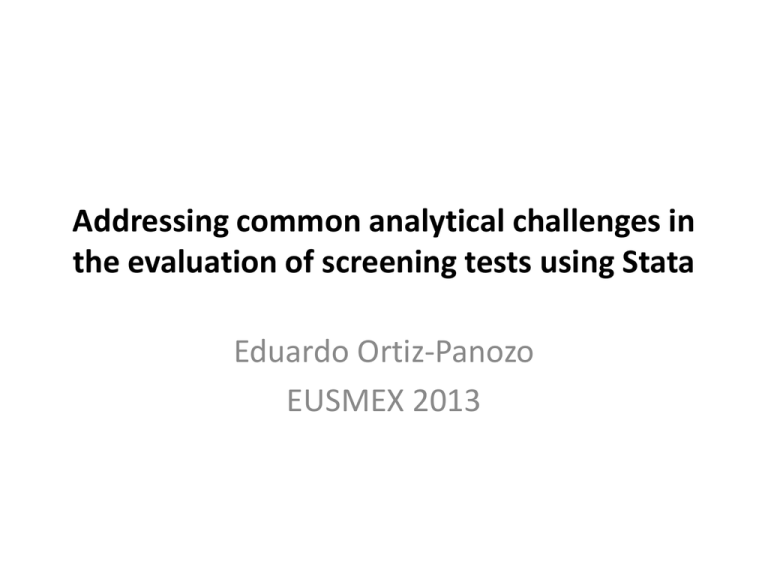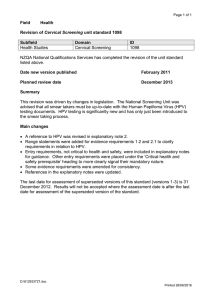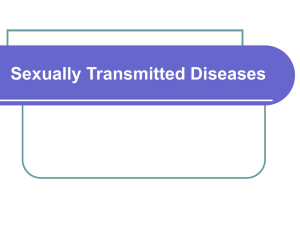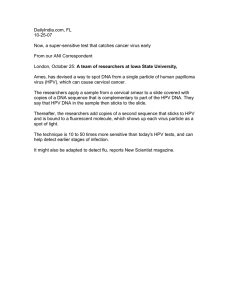Addressing common analytical challenges in Eduardo Ortiz-Panozo EUSMEX 2013
advertisement

Addressing common analytical challenges in the evaluation of screening tests using Stata Eduardo Ortiz-Panozo EUSMEX 2013 Evaluation of screening tests • Frequent in public health Early stages of disease • Types: – Comparing results to a gold standard – Comparing results among tests Common analytical challenges • Verification bias – Positive results are more likely to be confirmed by a gold standard • Correlated observations – More than one test applied in each individual Summary statistics 𝑆𝑒𝑛𝑠𝑖𝑡𝑖𝑣𝑖𝑡𝑦 = 𝑆𝑒𝑛𝑠 = Pr 𝑌 = 1 𝐷 = 1 𝑆𝑝𝑒𝑐𝑖𝑓𝑖𝑐𝑖𝑡𝑦 = 𝑆𝑝𝑒𝑐 = Pr 𝑌 = 0 𝐷 = 0 𝑃𝑜𝑠𝑖𝑡𝑖𝑣𝑒 𝑝𝑟𝑒𝑑𝑖𝑐𝑡𝑖𝑣𝑒 𝑣𝑎𝑙𝑢𝑒 = 𝑃𝑃𝑉 = Pr 𝐷 = 1 𝑌 = 1 𝑁𝑒𝑔𝑎𝑡𝑖𝑣𝑒 𝑝𝑟𝑒𝑑𝑖𝑐𝑡𝑖𝑣𝑒 𝑣𝑎𝑙𝑢𝑒 = 𝑁𝑃𝑉 = Pr 𝐷 = 0 𝑌 = 0 Pr 𝑌 = 1 𝐷 = 1 𝑃𝑜𝑠𝑖𝑡𝑖𝑣𝑒 𝑙𝑖𝑘𝑒𝑙𝑖ℎ𝑜𝑜𝑑 𝑟𝑎𝑡𝑖𝑜 = 𝐿𝑅+= Pr[Y = 1|D = 0] Pr 𝑌 = 0 𝐷 = 1 𝑁𝑒𝑔𝑎𝑡𝑖𝑣𝑒 𝑙𝑖𝑘𝑒𝑙𝑖ℎ𝑜𝑜𝑑 𝑟𝑎𝑡𝑖𝑜 = 𝐿𝑅−= [Y = 0|D = 0] Pr Comparison of tests by log-linear models log Pr 𝑌 = 1 𝐷 = 1, 𝑇 exp 𝛽1 Pr 𝑌 = 1 𝐷 = 1, 𝑇 = 1 = 𝑟𝑆𝑒𝑛𝑠 = [Y = 1|D = 1, T = 0] Pr log Pr 𝐷 = 𝑌 𝑌, 𝑇, 𝑌𝑇 exp 𝛽2 + 𝛽3 Pepe (2003) = 𝛽0 + 𝛽1 𝑇 = 𝛽0 + 𝛽1 𝑌 + 𝛽2 𝑇 + 𝛽3 𝑌𝑇 Pr 𝐷 = 1 𝑌 = 1, 𝑇 = 1 = 𝑟𝑃𝑃𝑉 = [D = 1|Y = 1, T = 0] Pr Pros of the regression approach • • • • Weighting (IPW, probability of verification) Robust Standard Errors (Correlation) Efficiency Adjustment for covariates Pepe (2003) Numerical example: Cervical Cancer Detection Program, Morelos, 2009 • First HPV, then Pap to the same women • Two-stage sampling for verification: 1) Health facilities 2) Women • Prob. verification among HPV+ = 1 • Prob. verification among HPV- ~0.05 • Comparison of 4 strategies • n=5,980 Naïve estimation -diagt. diagt BIO23 hpv hpv biopsy Pos. Neg. Total Abnormal Normal 79 399 3 144 82 543 Total 478 147 625 True abnormal diagnosis defined as BIO23 = 1 (labelled +) [95% Confidence Interval] --------------------------------------------------------------------------Prevalence Pr(A) 13% 11% 16% --------------------------------------------------------------------------Sensitivity Pr(+|A) 96.3% 89.7% 99.2% Specificity Pr(-|N) 26.5% 22.9% 30.4% ROC area (Sens. + Spec.)/2 .614 .587 .642 --------------------------------------------------------------------------Likelihood ratio (+) Pr(+|A)/Pr(+|N) 1.31 1.23 1.4 Likelihood ratio (-) Pr(-|A)/Pr(-|N) .138 .045 .423 Odds ratio LR(+)/LR(-) 9.5 3.12 28.9 Positive predictive value Pr(A|+) 16.5% 13.3% 20.2% Negative predictive value Pr(N|-) 98% 94.2% 99.6% --------------------------------------------------------------------------- Sampling design . svydes Survey: Describing stage 1 sampling units pweight: VCE: Single unit: Strata 1: SU 1: FPC 1: pw2 linearized certainty strata nocs fpc #Obs per Unit Stratum #Units #Obs min mean max 1 2 3 31 8 27 2599 1563 1818 29 66 10 83.8 195.4 67.3 442 649 377 3 66 5980 10 90.6 649 . tab hpv, sum(pw2) hpv Summary of pw2 Mean Std. Dev. Freq. + 19.14039 1 12.69373 0 1795 4185 Total 6.4451505 10.839113 5980 Estimation considering verification bias . svy: tab BIO23 hpv, row ci (running tabulate on estimation sample) Number of strata Number of PSUs = = 3 57 Number of obs Population size Design df hpv biopsy - + Total - .8828 [.8526,.9075] .1172 [.0925,.1474] 1 + .373 [.2863,.4688] .627 [.5312,.7137] 1 Total .8646 [.8304,.8928] .1354 [.1072,.1696] 1 Key: row proportions [95% confidence intervals for row proportions] Pearson: Uncorrected Design-based chi2(1) F(1, 54) = = 47.7550 179.8197 P = 0.0000 = = = 625 3531 54 HPV testing vs biopsy, by –diagt– and –svy:tab– (n=625) -diagt- -svy:tab- Summary statistics Pr Sensitivity 0.96 0.90 0.99 0.63 0.53 0.71 Specificity 0.27 0.23 0.30 0.88 0.85 0.91 Positive predictive value 0.17 0.13 0.20 0.17 0.15 0.19 Negative predictive value 0.98 0.98 0.99 CI95% 0.98 0.94 1.00 Pr CI95% Comparing screening strategies, including adjustments for verification bias and correlated observations . svy: glm y i.test if BIO23==1, link(log) family(bin) eform nolog /*search diff*/ (running glm on estimation sample) Survey: Generalized linear models Number of strata Number of PSUs = = 3 35 Linearized Std. Err. y exp(b) test 2 3 4 1.204208 .8383724 1.326153 .1023847 .0574411 .0609956 _cons .5206612 .0802986 Number of obs Population size Design df t = = = 323 499 32 P>|t| [95% Conf. Interval] 2.19 -2.57 6.14 0.036 0.015 0.000 1.012717 .7291663 1.207551 1.431907 .9639341 1.456403 -4.23 0.000 .3802978 .7128309 Comparison of screening strategies, by loglinear modelling (n=625) Relative statistics Pap HPV rSens 1 1.2* 0.8* 1.3*** r(1-Spec) 1 5.8*** 0.3*** 6.5*** rPPV 1 0.3*** 1.5** 0.3*** rNPV 1 1.0 1.0 1.0 Reference test: Pap smear * p<.05, ** p<.01, *** p<.001 Combined Sequential Conclusion GLM module of Stata allows the necessary specifications for the evaluation of screening tests, adjusting for common challenges in evaluation of screening tests, namely correlation between observations and verification bias. References • Seed PT, Tobias A. Summary statistics for diagnostic tests. Stata Technical Bulletin 2001;59:9-12 • Pepe MS. The statistical evaluation of medical tests for classification and prediction. Oxford Statistical Science Series, Oxford University Press. 2003



